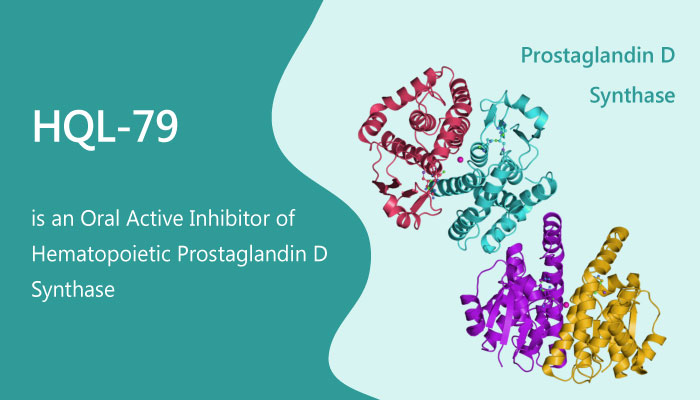Human Hematopoietic Prostaglandin D Synthase (H-PGDS) is a protein expressed in humans. It belongs to the sigma class glutathione-S-transferase family. H-PGDS catalyzes PGH2 to produce PGD2. The enzyme produces prostanoids in the immune system and mast cells.
H-PGDS inhibitors blocks allergic and inflammatory reactions. They function through both DP and CRTH2 receptors. These compounds are more useful than COX-1 or COX-2 inhibitors.
HQL-79 is a potent, orally selective H-PGDS inhibitor. It blocks the conversion of PGH2 to PGD2 in previous study. Thus, scientists carry out a lot of experiments to study on the compound.

In cellular assays, HQL-79 exhibits potent activity against H-PGDS.
On one hand, HQL-79 selectively suppresses PGD2 production, slightly alters that of PGE2, and PGF2. It exerts inhibitory effect on rat as well as human mastocytoma cells.
On the other hand, HQL-79 inhibits the recombinant human H-PGDS activity, with an IC50 of 6 μM. However, it shows no obvious effect on COX-1, COX-2, m-PGES, or L-PGDS at up to 300 μM. HQL-79 competitively inhibits H-PGDS activity against PGH2, and non-competitively against GSH. The Ki values are 5 and 3 μM, respectively. In addition, HQL-79 binds to human H-PGDS, with a Kd of 0.8 μM.
Furthermore, HQL-79 displays significant activity in mice. Oral administration at 30 mg/kg of HQL-79 decreases the PGD2 level in both H1R-KO and WT (C57BL/6 strain) mice. The inhibitor also blocks allergic lung inflammation.
HQL-79 is an orally selective H-PGDS, exhibits anti-inflammation activity. Scientists need to go on further study of the compound in the inflammation research.
References:
1. Aritake K, et al. J Biol Chem. 2006 Jun 2;281(22):15277-86.